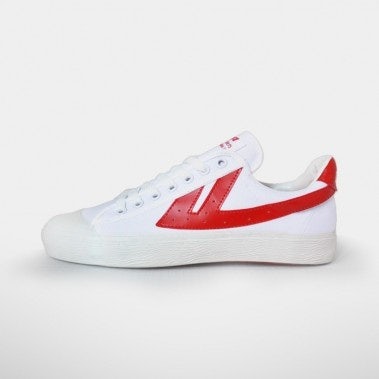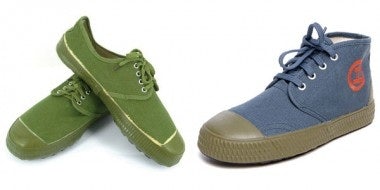Huili ("Warrior") Looks To Go Upmarket After Intensive Rebranding Effort#

In 2006, a group of Shanghai-based Frenchmen purchased the rights to the Chinese sneaker brand Feiyue, launching a "revised" version of the classic plimsoll in their home country at a significant markup. In the four years since, the reimagined Feiyue has made its way to shops throughout Europe, the UK and Asia, formed high-profile design partnerships with French street artist Steph.Cop and upscale brand Celine, and been spotted on the feet of celebrities like Orlando Bloom. Now, following the success of Feiyue in overseas markets and among some of Hong Kong and mainland China's hipper crowds, the domestic Chinese sneaker brand Huili (回力, also sold under the English name "Warrior") is set to relaunch with a specialized boutique at Hangzhou's upscale Yintai mall.
From QQ Luxury (translation by Jing Daily team):
Early last year, the collaboration between Celine and Feiyue launched in Hangzhou, immediately becoming a hit despite its hefty 1450 yuan (US$213) price tag. Just as the new product hit the market, it sold out. At the same time, the old Chinese brand Feiyue also was bought up at the mall, and Huili shoes, which have built up a rapid fanbase online, suddenly has a serious following.
First there was the Feiyue boom, and now Huili is coming home. Yesterday, Yintai (Intime) Shopping Mall (Wulin location) revealed that a specialized boutique on the 7th floor will sell the all-new Huili starting this September, and will carry the Huili series that have been popular in Europe.
[At the new Huili boutique in Hangzhou], the brand will be labeled with its English name, "Warrior." Although the new store will only be about 20 square meters in size, it'll have plenty of inventory, with the company planning to carry more than 70 varieties through the remainder of the year and upwards of 120 varieties next year.
"Huili shoes are quite expensive in foreign markets, running for 50-120 euros a pair, but in China they're going to be much cheaper," a source at Yintai revealed, adding that a pair of "Warrior" shoes at the new boutique should run between 200-300 yuan ($29-44), though a "classic" edition will cost only 185 yuan ($27).
"Although Huili shoes can be purchased online for less, the materials used in the shoes sold in the new boutique are different, as you can tell if you try them on," [the Huili source said].

Looking at the trend of Chinese brands from the 1970s or before, which previously were widely derided as too "bumpkin" but have gained popularity in China after being discovered by expats or influential tastemakers abroad -- the article goes on to reflect on the renaissance of shoe brands like Feiyue, Huili and Liberation (解放鞋).
Recently, a Japanese online shopping site launched a new wave of products that stunned people in China: a new and improved version of the Chinese "Liberation" shoe, which immediately became a "must-have."
Liberation shoes were one of the four or five most popular brands of the last century, but by the 1990s they were perceived as "bumpkin" and fell out of favor, being only seen as work shoes. Now we see them in the limelight in Japan and sold in the U.S., though. It's been reported that Liberation shoes -- which sell for less than 2 US dollars in China -- are sold for around 240 yuan ($35) in Japan and as much as $76 in the United States. (Editor's Note: the $76 Liberation shoes mentioned in this article are actually sold by Ospop ("One Small Point of Pride"), a company started in 2007 by an American businessman in Shanghai.)
From Feiyue to Huili, then Liberation, why have these old brands gradually disappeared from the shelves of domestic department stores, then been revived and made hip by Europeans and Americans? Insiders suggest that it's because foreigners are excellent at branding and product packaging, and as a very small minority gets into a certain brand that has gradually become rare and hard-to-find, it becomes popular among young people.